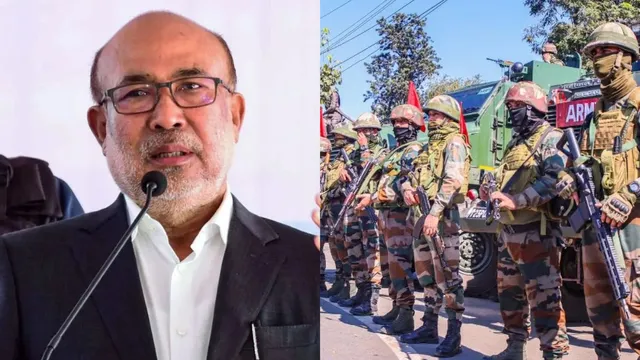- By Aashish Vashistha
- Thu, 13 Feb 2025 08:39 PM (IST)
- Source:JND
President’s Rule was imposed in strife-torn Manipur on Thursday (February 13) days after BJP leader N Biren Singh stepped down from the chief minister’s post amid ongoing ethnic violence in the northeastern state. Singh’s resignation came nearly 21 months after the ethnic violence broke out in Manipur which resulted in the deaths of over 250 and displaced several people.
A Ministry of Home Affairs (MHA) notification stated that President Droupadi Murmu is of the opinion that "a situation has arisen in which the government of that state cannot be carried on in accordance with the provisions of the Constitution".
“Now, therefore, in the exercise of the powers conferred by Article 356 of the Constitution, and of all other powers enabling me in that behalf, I hereby proclaim that I – assume to myself as President of India all functions of the Government of the State of Manipur and all powers vested in or exercisable by the Governor of that State," the notification further read.
What Is President Rule And How Is It Imposed
President's Rule refers to the suspension of a state government and the establishment of direct control by the Union government. According to Article 356 of the Indian Constitution, if a state government fails to operate in accordance with constitutional guidelines, the Union government is empowered to assume direct control over the state's administration. The decision to impose the President’s rule comes after taking advice from the Union Council of Ministers. However, the functioning of the High Courts will remain unaffected even after the President’s rule.
What Happens To State Functions After President’s Rule Is Imposed
Once President’s Rule is imposed in the state, the Governor assumes control of the state's administration on behalf of the President, working with the Chief Secretary and appointed advisors. The state legislative assembly can either be suspended or dissolved, and its powers are transferred to Parliament. This means the state legislature no longer has the authority to legislate or influence policies.
ALSO READ: President's Rule Imposed In Manipur Days After CM Biren Singh’s Resignation Over Continuous Violence
In this scenario, Parliament takes over the legislative powers of the state. This ensures the state remains governed despite the absence of a functioning state government.
Additionally, when Parliament is not in session, the President can issue ordinances to manage the state's administration. These ordinances have the same authority as laws passed by Parliament but require approval once Parliament reconvenes. This system guarantees that governance continues smoothly during the President's Rule.

